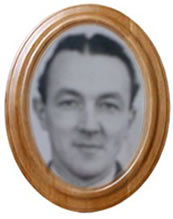
Return To Veterans Accounts Index
Grandfather's Story
A CIVILIAN GOES TO WAR, (AND RETURNS UNSCATHED)
by
Cpl. Arthur George Pike 14260370
Page 7
move straight into
his slit-trench. I was wary of the risk of the sides falling in as the
ground was the sand of the riverbed; I had remembered this risk from playing
in the sand dunes at Saunton. My time had been spent for several days in the
Admin Box sorting out problems various men had with their pay. These had been
brought to the notice
of the new C.O., freshly drafted out from Ireland. A friend in the Orderly
Room told me the casualty rate dropped dramatically when he took over.
The whole I Section was sent out one morning to contact A Company in a forward
position; I was sent across a very open piece of ground, a part of the dried-up
river bed. A shot rang out, which may or may not have been concerned with us. I raced to
the nearest cover, which happened to be held by A Company. One of them asked me what I
would have done if it had been an enemy position.
While we were in the Masts O.P. there was one special moment. We had a telephone
line connection to H.Q., which was broken during an air strike by Spitfires. (Friendly
fire!).
After several weeks the enemy melted away. I was given the job of mapping the
bomb craters on 15R,so that the American bomber pilots could see the result of their
missions. The cliff top provided wonderful natural shelters in small chaungs worn down
in the monsoons.
We were brought back to reinforce the other brigades who had crossed in the
Singu bridgehead and were holding Pear Hill and Min Ban Taung, both shrouded with
parachutes, but remaining in our hands. The rest of our brigade had crossed
the river further up and were chasing the enemy down the other side. They didn't need
us over there. So it came about that I crossed the mighty river at the back of the
last boat to carry 19 Div across. I hadn't seen anything of the shipyards created on the bank
to supply the demand. All our supplies were dropped from the air, and there was no need for
lines of communication on the ground.
After some skirmishing I was at Shwedong waiting for the big push on Mandalay
to start. A sniper had me in his sights and fired. A blade of elephant grass
beside me snapped off; I don't think his ancestors could have had rabbits!
I heard how lorries were thwarted by a chaung across the line of advance. It
seems an enterprising officer had a lorry turned over so that the other vehicles could
cross on top of it. Could this be the officer quality I had heard so much about?
Seemingly in no time at all we were in sight of Mandalay Hill. Enemy forces
falling back on Madaya did not understand we had already captured it. On March 10th we stood
at the entrance to Mandalay. It was my mother's birthday, a fact of little significance!
It was at this point our mules caught us up; they had had to walk along behind
as fast as they could. B Company had gone on ahead to capture a road crossing in the west
of the city. It was getting late and the Colonel wanted to send them supplies, but
he didn't know where they were. I rashly said I knew - well they had advanced down a straight
street,
P 1 :: P
2 :: P 3 :: P
4 :: P 5 :: P
6 :: P
7 :: P 8 :: P
9 :: P
10

Cpl. Arthur George Pike 6400751
